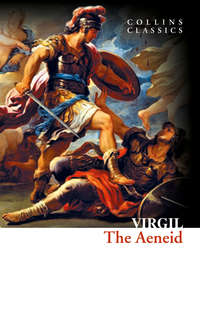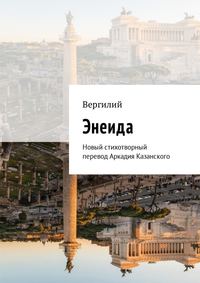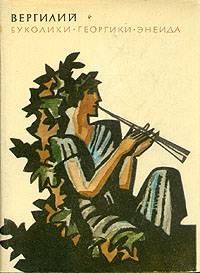 полная версия
полная версияThe Aeneid of Virgil
They meantime have hasted along where the pathway points, and now were climbing the hill which hangs enormous over the city, and looks down on its facing towers. Aeneas marvels at the mass of building, pastoral huts once of old, marvels at the gateways and clatter of the pavements. The Tyrians are hot at work to trace the walls, to rear the citadel, and roll up great stones by hand, or to choose a spot for their dwelling and enclose it with a furrow. They ordain justice and magistrates, and the august senate. Here some are digging harbours, here others lay the deep foundations of their theatre, and hew out of the cliff vast columns, the lofty ornaments of the stage to be: even as bees when summer is fresh over the flowery country ply their task beneath the sun, when they lead forth their nation's grown brood, or when they press the liquid honey and strain their cells with nectarous sweets, or relieve the loaded incomers, or in banded array drive the idle herd of drones far from their folds; they swarm over their work, and the odorous honey smells sweet of thyme. 'Happy they whose city already rises!' cries Aeneas, looking on the town roofs below. Girt in the cloud he passes amid them, wonderful to tell, and mingling with the throng is descried of none.
In the heart of the town was a grove deep with luxuriant shade, wherein first the Phoenicians, buffeted by wave and whirlwind, dug up the token Queen Juno had appointed, the head of a war horse: thereby was their race to be through all ages illustrious in war and opulent in living. Here to Juno was Sidonian Dido founding a vast temple, rich with offerings and the sanctity of her godhead: brazen steps rose on the threshold, brass clamped the pilasters, doors of brass swung on grating hinges. First in this grove did a strange chance meet his steps and allay his fears; first here did Aeneas dare to hope for safety and have fairer trust in his shattered fortunes. For while he closely scans the temple that towers above him, while, awaiting the queen, he admires the fortunate city, the emulous hands and elaborate work of her craftsmen, he sees ranged in order the battles of Ilium, that war whose fame was already rumoured through all the world, the sons of Atreus and Priam, and Achilles whom both found pitiless. He stopped and cried weeping, 'What land is left, Achates, what tract on earth that is not full of our agony? Behold Priam! Here too is the meed of honour, here mortal estate touches the soul to tears. Dismiss thy fears; the fame of this will somehow bring thee salvation.'
So speaks he, and fills his soul with the painted show, sighing often the while, and his face wet with a full river of tears. For he saw, how warring round the Trojan citadel here the Greeks fled, the men of Troy hard on their rear; here the Phrygians, plumed Achilles in his chariot pressing their flight. Not far away he knows the snowy canvas of Rhesus' tents, which, betrayed in their first sleep, the blood-stained son of Tydeus laid desolate in heaped slaughter, and turns the ruddy steeds away to the camp ere ever they tasted Trojan fodder or drunk of Xanthus. Elsewhere Troïlus, his armour flung away in flight—luckless boy, no match for Achilles to meet!—is borne along by his horses, and thrown back entangled with his empty chariot, still clutching the reins; his neck and hair are dragged over the ground, and his reversed spear scores the dust. Meanwhile the Ilian women went with disordered tresses to unfriendly Pallas' temple, and bore the votive garment, sadly beating breast with palm: the goddess turning away held her eyes fast on the ground. Thrice had Achilles whirled Hector round the walls of Troy, and was selling the lifeless body for gold; then at last he heaves a loud and heart-deep groan, as the spoils, as the chariot, as the dear body met his gaze, and Priam outstretching unarmed hands. Himself too he knew joining battle with the foremost Achaeans, knew the Eastern ranks and swart Memnon's armour. Penthesilea leads her crescent-shielded Amazonian columns in furious heat with thousands around her; clasping a golden belt under her naked breast, the warrior maiden clashes boldly with men.
While these marvels meet Dardanian Aeneas' eyes, while he dizzily hangs rapt in one long gaze, Dido the queen entered the precinct, beautiful exceedingly, a youthful train thronging round her. Even as on Eurotas' banks or along the Cynthian ridges Diana wheels the dance, while behind her a thousand mountain nymphs crowd to left and right; she carries quiver on shoulder, and as she moves outshines them all in deity; Latona's heart is thrilled with silent joy; such was Dido, so she joyously advanced amid the throng, urging on the business of her rising empire. Then in the gates of the goddess, beneath the central vault of the temple roof, she took her seat girt with arms and high enthroned. And now she gave justice and laws to her people, and adjusted or allotted their taskwork in due portion; when suddenly Aeneas sees advancing with a great crowd about them Antheus and Sergestus and brave Cloanthus, and other of his Trojans, whom the black squall had sundered at sea and borne far away on the coast. Dizzy with the shock of joy and fear he and Achates together were on fire with eagerness to clasp their hands; but in confused uncertainty they keep hidden, and clothed in the sheltering cloud wait to espy what fortune befalls them, where they are leaving their fleet ashore, why they now come; for they advanced, chosen men from all the ships, praying for grace, and held on with loud cries towards the temple.
After they entered in, and free speech was granted, aged Ilioneus with placid mien thus began:
'Queen, to whom Jupiter hath given to found this new city, and lay the yoke of justice upon haughty tribes, we beseech thee, we wretched Trojans storm-driven over all the seas, stay the dreadful flames from our ships; spare a guiltless race, and bend a gracious regard on our fortunes. We are not come to deal slaughter through Libyan homes, or to drive plundered spoils to the coast. Such violence sits not in our mind, nor is a conquered people so insolent. There is a place Greeks name Hesperia, an ancient land, mighty in arms and foison of the clod; Oenotrian men dwelt therein; now rumour is that a younger race from their captain's name have called it Italy. Thither lay our course . . . when Orion rising on us through the cloudrack with sudden surf bore us on blind shoals, and scattered us afar with his boisterous gales and whelming brine over waves and trackless reefs. To these your coasts we a scanty remnant floated up. What race of men, what land how barbarous soever, allows such a custom for its own? We are debarred the shelter of the beach; they rise in war, and forbid us to set foot on the brink of their land. If you slight human kinship and mortal arms, yet look for gods unforgetful of innocence and guilt. Aeneas was our king, foremost of men in righteousness, incomparable in goodness as in warlike arms; whom if fate still preserves, if he draws the breath of heaven and lies not yet low in dispiteous gloom, fear we have none; nor mayest thou repent of challenging the contest of service. In Sicilian territory too is tilth and town, and famed Acestes himself of Trojan blood. Grant us to draw ashore our storm-shattered fleet, to shape forest trees into beams and strip them for oars; so, if to Italy we may steer with our king and comrades found, Italy and Latium shall we gladly seek; but if salvation is clean gone, if the Libyan gulf holds thee, dear lord of thy Trojans, and Iülus our hope survives no more, seek we then at least the straits of Sicily, the open homes whence we sailed hither, and Acestes for our king.' Thus Ilioneus, and all the Dardanian company murmured assent. . . . Then Dido, with downcast face, briefly speaks:
'Cheer your anxious hearts, O Teucrians; put by your care. Hard fortune in a strange realm forces me to this task, to keep watch and ward on my wide frontiers. Who can be ignorant of the race of Aeneas' people, who of Troy town and her men and deeds, or of the great war's consuming fire? Not so dull are the hearts of our Punic wearing, not so far doth the sun yoke his steeds from our Tyrian town. Whether your choice be broad Hesperia, the fields of Saturn's dominion, or Eryx for your country and Acestes for your king, my escort shall speed you in safety, my arsenals supply your need. Or will you even find rest here with me and share my kingdom? The city I establish is yours; draw your ships ashore; Trojan and Tyrian shall be held by me in even balance. And would that he your king, that Aeneas were here, storm-driven to this same haven! But I will send messengers along the coast, and bid them trace Libya to its limits, if haply he strays shipwrecked in forest or town.'
Stirred by these words brave Achates and lord Aeneas both ere now burned to break through the cloud. Achates first accosts Aeneas: 'Goddess-born, what purpose now rises in thy spirit? Thou seest all is safe, our fleet and comrades are restored. One only is wanting, whom our eyes saw whelmed amid the waves; all else is answerable to thy mother's words.'
Scarce had he spoken when the encircling cloud suddenly parts and melts into clear air. Aeneas stood discovered in sheen of brilliant light, like a god in face and shoulders; for his mother's self had shed on her son the grace of clustered locks, the radiant light of youth, and the lustre of joyous eyes; as when ivory takes beauty under the artist's hand, or when silver or Parian stone is inlaid in gold. Then breaking in on all with unexpected speech he thus addresses the queen:
'I whom you seek am here before you, Aeneas of Troy, snatched from the Libyan waves. O thou who alone hast pitied Troy's untold agonies, thou who with us the remnant of the Grecian foe, worn out ere now by every suffering land and sea can bring, with us in our utter want dost share thy city and home! to render meet recompense is not possible for us, O Dido, nor for all who scattered over the wide world are left of our Dardanian race. The gods grant thee worthy reward, if their deity turn any regard on goodness, if aught avails justice and conscious purity of soul. What happy ages bore thee? what mighty parents gave thy virtue birth? While rivers run into the sea, while the mountain shadows move across their slopes, while the stars have pasturage in heaven, ever shall thine honour, thy name and praises endure in the unknown lands that summon me.' With these words he advances his right hand to dear Ilioneus, his left to Serestus; then to the rest, brave Gyas and brave Cloanthus.
Dido the Sidonian stood astonished, first at the sight of him, then at his strange fortunes; and these words left her lips:
'What fate follows thee, goddess-born, through perilous ways? what violence lands thee on this monstrous coast? Art thou that Aeneas whom Venus the bountiful bore to Dardanian Anchises by the wave of Phrygian Simoïs? And well I remember how Teucer came to Sidon, when exiled from his native land he sought Belus' aid to gain new realms; Belus my father even then ravaged rich Cyprus and held it under his conquering sway. From that time forth have I known the fall of the Trojan city, known thy name and the Pelasgian princes. Their very foe would extol the Teucrians with highest praises, and boasted himself a branch of the ancient Teucrian stem. Come therefore, O men, and enter our house. Me too hath a like fortune driven through many a woe, and willed at last to find my rest in this land. Not ignorant of ill do I learn to succour the afflicted.'
With such speech she leads Aeneas into the royal house, and orders sacrifice in the gods' temples. Therewith she sends his company on the shore twenty bulls, an hundred great bristly-backed swine, an hundred fat lambs and their mothers with them, gifts of the day's gladness. . . . But the palace within is decked with splendour of royal state, and a banquet made ready amid the halls. The coverings are curiously wrought in splendid purple; on the tables is massy silver and deeds of ancestral valour graven in gold, all the long course of history drawn through many a heroic name from the nation's primal antiquity.
Aeneas—for a father's affection denied his spirit rest—sends Achates speeding to his ships, to carry this news to Ascanius, and lead him to the town: in Ascanius is fixed all the parent's loving care. Presents likewise he bids him bring saved from the wreck of Ilium, a mantle stiff with gold embroidery, and a veil with woven border of yellow acanthus-flower, that once decked Helen of Argos, the marvel of her mother Leda's giving; Helen had borne them from Mycenae, when she sought Troy towers and a lawless bridal; the sceptre too that Ilione, Priam's eldest daughter, once had worn, a beaded necklace, and a double circlet of jewelled gold. Achates, hasting on his message, bent his way towards the ships.
But in the Cytherean's breast new arts, new schemes revolve; if Cupid, changed in form and feature, may come in sweet Ascanius' room, and his gifts kindle the queen to madness and set her inmost sense aflame. Verily she fears the uncertain house, the double-tongued race of Tyre; cruel Juno frets her, and at nightfall her care floods back. Therefore to winged Love she speaks these words:
'Son, who art alone my strength and sovereignty, son, who scornest the mighty father's Typhoïan shafts, to thee I fly for succour, and sue humbly to thy deity. How Aeneas thy brother is driven about all the sea-coasts by bitter Juno's malignity, this thou knowest, and hast often grieved in our grief. Now Dido the Phoenician holds him stayed with soft words, and I tremble to think how the welcome of Juno's house may issue; she will not be idle in this supreme turn of fortune. Wherefore I counsel to prevent her wiles and circle the queen with flame, that, unalterable by any deity, she may be held fast to me by passionate love for Aeneas. Take now my thought how to do this. The boy prince, my chiefest care, makes ready at his dear father's summons to go to the Sidonian city, carrying gifts that survive the sea and the flames of Troy. Him will I hide deep asleep in my holy habitation, high on Cythera's hills or in Idalium, that he may not know nor cross our wiles. Do thou but for one night feign his form, and, boy as thou art, put on the familiar face of a boy; so when in festal cheer, amid royal dainties and Bacchic juice, Dido shall take thee to her lap, shall fold thee in her clasp and kiss thee close and sweet, thou mayest imbreathe a hidden fire and unsuspected poison.'
Love obeys his dear mother's words, lays by his wings, and walks rejoicingly with Iülus' tread. But Venus pours gentle dew of slumber on Ascanius' limbs, and lifts him lulled in her lap to the tall Idalian groves of her deity, where soft amaracus folds him round with the shadowed sweetness of its odorous blossoms. And now, obedient to her words, Cupid went merrily in Achates' guiding, with the royal gifts for the Tyrians. Already at his coming the queen hath sate her down in the midmost on her golden throne under the splendid tapestries; now lord Aeneas, now too the men of Troy gather, and all recline on the strewn purple. Servants pour water on their hands, serve corn from baskets, and bring napkins with close-cut pile. Fifty handmaids are within, whose task is in their course to keep unfailing store and kindle the household fire. An hundred others, and as many pages all of like age, load the board with food and array the wine cups. Therewithal the Tyrians are gathered full in the wide feasting chamber, and take their appointed places on the broidered cushions. They marvel at Aeneas' gifts, marvel at Iülus, at the god's face aflame and forged speech, at the mantle and veil wrought with yellow acanthus-flower. Above all the hapless Phoenician, victim to coming doom, cannot satiate her soul, but, stirred alike by the boy and the gifts, she gazes and takes fire. He, when hanging clasped on Aeneas' neck he had satisfied all the deluded parent's love, makes his way to the queen; the queen clings to him with her eyes and all her soul, and ever and anon fondles him in her lap, ah, poor Dido! witless how mighty a deity sinks into her breast; but he, mindful of his mother the Acidalian, begins touch by touch to efface Sychaeus, and sows the surprise of a living love in the long-since-unstirred spirit and disaccustomed heart. Soon as the noise of banquet ceased and the board was cleared, they set down great bowls and enwreathe the wine. The house is filled with hum of voices eddying through the spacious chambers; lit lamps hang down by golden chainwork, and flaming tapers expel the night. Now the queen called for a heavy cup of jewelled gold, and filled it with pure wine; therewith was the use of Belus and all of Belus' race: then the hall was silenced. 'Jupiter,' she cries, 'for thou art reputed lawgiver of hospitality, grant that this be a joyful day to the Tyrians and the voyagers from Troy, a day to live in our children's memory. Bacchus, the giver of gladness, be with us, and Juno the bountiful; and you, O Tyrians, be favourable to our assembly.' She spoke, and poured liquid libation on the board, which done, she first herself touched it lightly with her lips, then handed it to Bitias and bade him speed; he valiantly drained the foaming cup, and flooded him with the brimming gold. The other princes followed. Long-haired Iopas on his gilded lyre fills the chamber with songs ancient Atlas taught; he sings of the wandering moon and the sun's travails; whence is the human race and the brute, whence water and fire; of Arcturus, the rainy Hyades, and the twin Oxen; why wintry suns make such haste to dip in ocean, or what delay makes the nights drag lingeringly. Tyrians and Trojans after them redouble applause. Therewithal Dido wore the night in changing talk, alas! and drank long draughts of love, asking many a thing of Priam, many a thing of Hector; now in what armour the son of the Morning came; now of what fashion were Diomede's horses; now of mighty Achilles. 'Nay, come,' she cries, 'tell to us, O guest, from their first beginning the treachery of the Grecians, thy people's woes, and thine own wanderings; for this is now the seventh summer that bears thee a wanderer over all the earth and sea.'
BOOK SECOND
THE STORY OF THE SACK OF TROY
All were hushed, and sate with steadfast countenance; thereon, high from his cushioned seat, lord Aeneas thus began:
'Dreadful, O Queen, is the woe thou bidst me recall, how the Grecians pitiably overthrew the wealth and lordship of Troy; and I myself saw these things in all their horror, and I bore great part in them. What Myrmidon or Dolopian, or soldier of stern Ulysses, could in such a tale restrain his tears! and now night falls dewy from the steep of heaven, and the setting stars counsel to slumber. Yet if thy desire be such to know our calamities, and briefly to hear Troy's last agony, though my spirit shudders at the remembrance and recoils in pain, I will essay.
'Broken in war and beaten back by fate, and so many years now slid away, the Grecian captains build by Pallas' divine craft a horse of mountainous build, ribbed with sawn fir; they feign it vowed for their return, and this rumour goes about. Within the blind sides they stealthily imprison chosen men picked out one by one, and fill the vast cavern of its womb full with armed soldiery.
'There lies in sight an island well known in fame, Tenedos, rich of store while the realm of Priam endured, now but a bay and roadstead treacherous to ships. Hither they launch forth, and hide on the solitary shore: we fancied they were gone, and had run down the wind for Mycenae. So all the Teucrian land put her long grief away. The gates are flung open; men go rejoicingly to see the Doric camp, the deserted stations and abandoned shore. Here the Dolopian troops were tented, here cruel Achilles; here their squadrons lay; here the lines were wont to meet in battle. Some gaze astonished at the deadly gift of Minerva the Virgin, and wonder at the horse's bulk; and Thymoetes begins to advise that it be drawn within our walls and set in the citadel, whether in guile, or that the doom of Troy was even now setting thus. But Capys and they whose mind was of better counsel, bid us either hurl sheer into the sea the guileful and sinister gift of Greece, or heap flames beneath to consume it, or pierce and explore the hollow hiding-place of its womb. The wavering crowd is torn apart in high dispute.
'At that, foremost of all and with a great throng about him, Laocoön runs hotly down from the high citadel, and cries from far: "Ah, wretched citizens, what height of madness is this? Believe you the foe is gone? or think you any Grecian gift is free of treachery? is it thus we know Ulysses? Either Achaeans are hid in this cage of wood, or the engine is fashioned against our walls to overlook the houses and descend upon the city; some delusion lurks there: trust not the horse, O Trojans. Be it what it may, I fear the Grecians even when they offer gifts." Thus speaking, he hurled his mighty spear with great strength at the creature's side and the curved framework of the belly: the spear stood quivering, and the jarred cavern of the womb sounded hollow and uttered a groan. And had divine ordinance, had a soul not infatuate been with us, he had moved us to lay violent steel on the Argolic hiding place; and Troy would now stand, and you, tall towers of Priam, yet abide.
'Lo, Dardanian shepherds meanwhile dragged clamorously before the King a man with hands tied behind his back, who to compass this very thing, to lay Troy open to the Achaeans, had gone to meet their ignorant approach, confident in spirit and doubly prepared to spin his snares or to meet assured death. From all sides, in eagerness to see, the people of Troy run streaming in, and vie in jeers at their prisoner. Know now the treachery of the Grecians, and from a single crime learn all. . . . For as he stood amid our gaze confounded, disarmed, and cast his eyes around the Phrygian columns, "Alas!" he cried, "what land now, what seas may receive me? or what is the last doom that yet awaits my misery? who have neither any place among the Grecians, and likewise the Dardanians clamour in wrath for the forfeit of my blood." At that lament our spirit was changed, and all assault stayed: we encourage him to speak, and tell of what blood he is sprung, or what assurance he brings his captors.
'"In all things assuredly," says he, "O King, befall what may, I will confess to thee the truth; nor will I deny myself of Argolic birth—this first—nor, if Fortune hath made Sinon unhappy, shall her malice mould him to a cheat and a liar. Hath a tale of the name of Palamedes, son of Belus, haply reached thine ears, and of his glorious rumour and renown; whom under false evidence the Pelasgians, because he forbade the war, sent innocent to death by wicked witness; now they bewail him when he hath left the light;—in his company, being near of blood, my father, poor as he was, sent me hither to arms from mine earliest years. While he stood unshaken in royalty and potent in the councils of the kings, we too wore a name and honour. When by subtle Ulysses' malice (no unknown tale do I tell) he left the upper regions, my shattered life crept on in darkness and grief, inly indignant at the fate of my innocent friend. Nor in my madness was I silent: and, should any chance offer, did I ever return a conqueror to my native Argos, I vowed myself his avenger, and with my words I stirred his bitter hatred. From this came the first taint of ill; from this did Ulysses ever threaten me with fresh charges, from this flung dark sayings among the crowd and sought confederate arms. Nay, nor did he rest, till by Calchas' service—but yet why do I vainly unroll the unavailing tale, or why hold you in delay, if all Achaeans are ranked together in your mind, and it is enough that I bear the name? Take the vengeance deferred; this the Ithacan would desire, and the sons of Atreus buy at a great ransom."
'Then indeed we press on to ask and inquire the cause, witless of wickedness so great and Pelasgian craft. Tremblingly the false-hearted one pursues his speech:
'"Often would the Grecians have taken to flight, leaving Troy behind, and disbanded in weariness of the long war: and would God they had! as often the fierce sea-tempest barred their way, and the gale frightened them from going. Most of all when this horse already stood framed with beams of maple, storm clouds roared over all the sky. In perplexity we send Eurypylus to inquire of Phoebus' oracle; and he brings back from the sanctuary these words of terror: With blood of a slain maiden, O Grecians, you appeased the winds when first you came to the Ilian coasts; with blood must you seek your return, and an Argive life be the accepted sacrifice. When that utterance reached the ears of the crowd, their hearts stood still, and a cold shudder ran through their inmost sense: for whom is doom purposed? who is claimed of Apollo? At this the Ithacan with loud clamour drags Calchas the soothsayer forth amidst them, and demands of him what is this the gods signify. And now many an one foretold me the villain's craft and cruelty, and silently saw what was to come. Twice five days he is speechless in his tent, and will not have any one denounced by his lips, or given up to death. Scarcely at last, at the loud urgence of the Ithacan, he breaks into speech as was planned, and appoints me for the altar. All consented; and each one's particular fear was turned, ah me! to my single destruction. And now the dreadful day was at hand; the rites were being ordered for me, the salted corn, and the chaplets to wreathe my temples. I broke away, I confess it, from death; I burst my bonds, and lurked all night darkling in the sedge of the marshy pool, till they might set their sails, if haply they should set them. Nor have I any hope more of seeing my old home nor my sweet children and the father whom I desire. Of them will they even haply claim vengeance for my flight, and wash away this crime in their wretched death. By the heavenly powers I beseech thee, the deities to whom truth is known, by all the faith yet unsullied that is anywhere left among mortals; pity woes so great; pity an undeserving sufferer."








